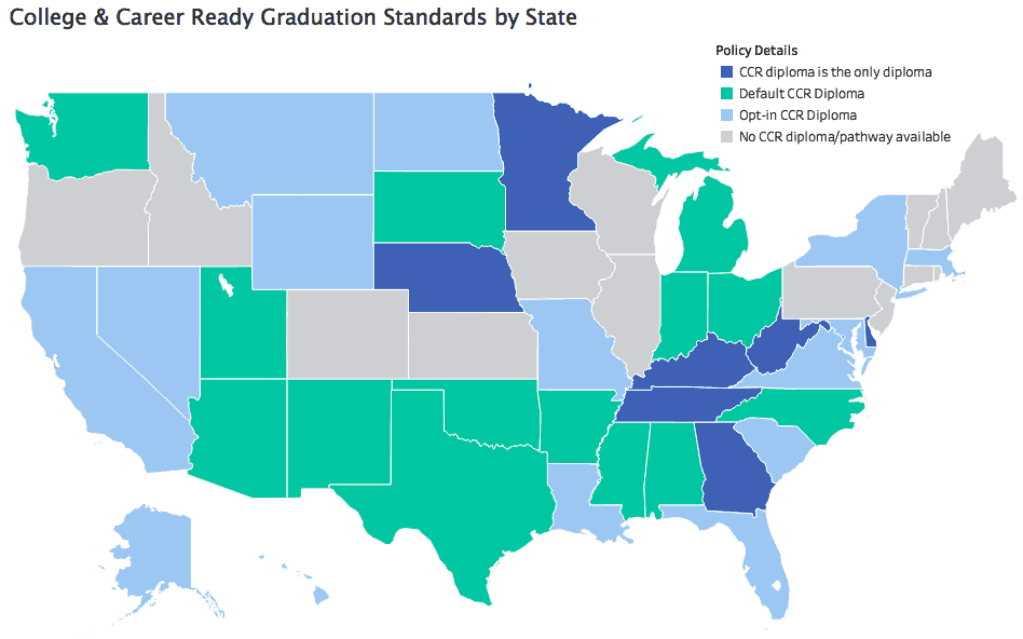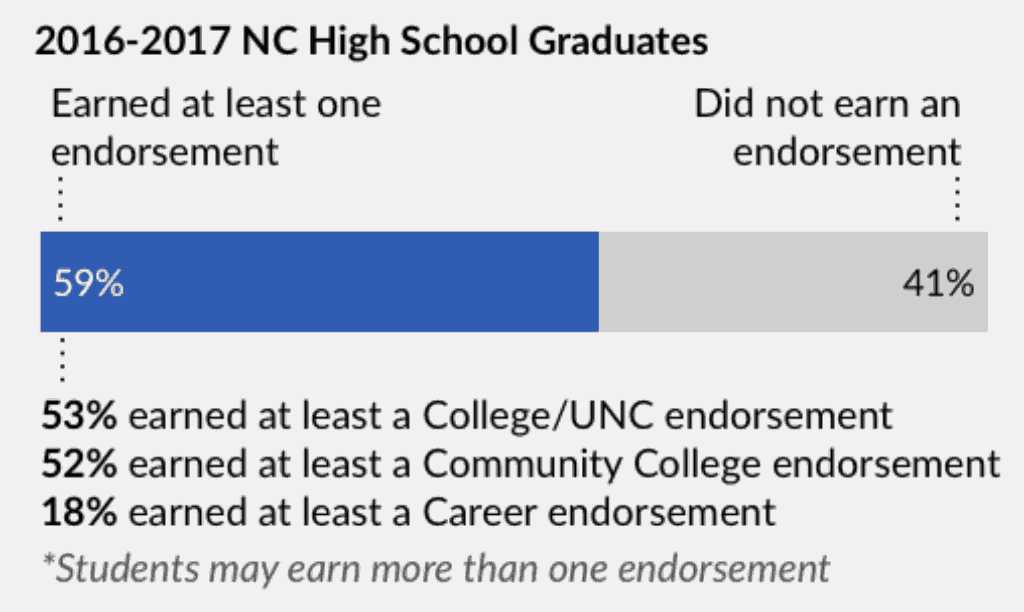As the myFutureNC Commission prepares to present a multi-year postsecondary attainment goal for North Carolina, it will be important to consider the standard high school course of study and ways in which it prepares students to pursue a college or career pathway upon graduating from high school. As we learned in our recent Intersection Webinar, there are more than 100 different paths to high school graduation across the country. This inspired our team to take a closer look at the pathways to obtaining a high school diploma in North Carolina, and how we measure up when it comes to college and career readiness and transparency.
Graduation requirements vary significantly across the country. Achieve reports that North Carolina is one of 21 states and the District of Columbia which offer a mandatory or default college and career ready course of study. All students who entered high school since 2009 have been required to complete the North Carolina Future-Ready Core course of study in order to graduate with a high school diploma. When compared to other states in the south, North Carolina is one of 10 states offering either a mandatory or default CCR course of study[1]. Additionally, the Future-Ready Core Occupational course of study is available for students with disabilities, making North Carolina one of only four states in the nation to offer a specific diploma pathway for students with disabilities[2].

There are 15 states in which students must opt-in to a course of study that meets CCR standards. The 14 remaining states do not include ELA and mathematics requirements that meet college and career standards as part of their required course of study. In states with opt-in CCR requirements, there can be significant discrepancies between subgroups in the completion of rigorous CCR courses. For example, in Massachusetts, where students must opt-in to CCR courses, 86% of white students complete a CCR diploma, compared to 71% of Hispanic students, and 64% of black students.
Beginning with the graduating class of 2014-15, North Carolina students attending traditional public schools have the option of pursuing one or more endorsements for their high school diploma. Available endorsements include:
- Career Endorsement
- College Endorsement (Community College)
- College/UNC Endorsement
- North Carolina Academic Scholars Endorsement
- Global Languages Endorsement

Endorsements are earned through both specific coursework and maintenance of a minimum grade point average; students completing the Career Endorsement must also earn an industry-recognized credential. The 2018-2019 school year will mark four years since students began earning endorsements, making it possible to begin measuring post-secondary outcomes for students who earned endorsements. At this time, subgroup data regarding endorsement completion is not reported.
In addition to publishing data about graduation requirements, Achieve measured the transparency of each state’s public reporting on college and career readiness. Based on eight indicators, Achieve found that North Carolina ranks below the national average when it comes to transparency of public reporting on the college and career readiness of our graduates. When compared to neighboring states, North Carolina ranked higher than only one other state in the south. In addition to failing to report on postsecondary measures, including postsecondary enrollment, postsecondary remediation, and postsecondary persistence, North Carolina does not publicly share data regarding the number of students on track to graduate. The upcoming completion of the North Carolina SchoolWorks System, our state longitudinal data system, will enable school leaders and policymakers to track student performance from Pre-K to the workforce and offers an opportunity to improve transparency regarding college and career readiness.
As we look ahead to a multi-year postsecondary attainment goal, it is reassuring to know that North Carolina high school students are required to complete a course of study which prepares them to graduate college and career ready.
[1] Southern states include the 16 member-states of the Southern Regional Education Board.
[2] https://all4ed.org/wp-content/uploads/2017/10/Diploma_Paper-UPDATE-10-17.pdf
Editor’s note: This perspective was originally published by The Hunt Institute. It has been posted with the author’s permission.

